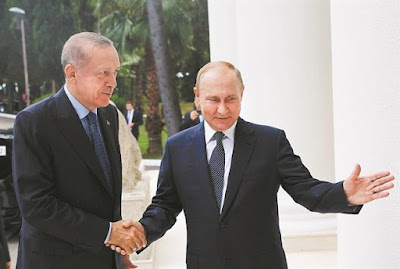Filenews 1 September 2022
Turkey has become Russia's best means of circumventing the sanctions imposed on it by Western countries. And trade cooperation between the two states is developing considerably thanks to the facilities provided by Ankara.
With the Turkish economy in dire straits and inflation at 80%, Turkish President Tayyip Erdoğan urgently needs an inflow of capital so as not to lose next year's crucial elections, and his Russian counterpart, Vladimir Putin, is willing to offer them in exchange for turning Turkey into a crack in the architecture of Western sanctions that will allow his country to continue procuring the goods and spare parts that the European Union no longer sells to Russia.
Turkey is the only NATO country that has not supported sanctions against Russia, although it has closed its straits to the passage of Russian military ships heading for the Black Sea and continues to supply armed drones to Ukraine. Ankara argues that this "balanced" policy allowed it to maintain open lines with Moscow and mediate to achieve, for example, the creation of the corridor allowing the export of grain that had been blocked to Ukraine.
But it is also useful for other purposes. Every day more than 120 flights from Russian cities land in Turkey. They are operated by Turkish and Russian airlines with European-made or American-made aircraft, apparently without fear that they will run out of spare parts if something goes wrong. Planes travel full. In the first seven months of this year, 2.2 million Russians entered Turkey, 41% more than the previous year. Passengers range from young people escaping from the increasingly suffocating atmosphere of Putinism, to tourists who can no longer enjoy the sun on EU beaches. Also, entrepreneurs looking for opportunities.
The number of Russians with residence permits in Turkey has risen from 70,000 before the war in Ukraine to more than 105,000. Between March and June, nearly 6,000 properties in Turkey were sold to Russian citizens, a number four times higher than in the same period in 2021. There are those who buy a house to protect their economies, but others do it to obtain Turkish citizenship, which happens almost automatically if more than $250,000 is invested (400,000 since May).
According to an article in the financial newspaper 'Dünya', these young Turkish citizens play a key role in the mediation between EU producers and the Russian market. With a Turkish passport and through companies that officially appear to be Turkish, they are free to trade with both the EU and Russia. Data from the Association of Chambers of Commerce show that between January and July, 601 companies with Russian capital were established in Turkey, of which more than half are involved in import and export activities. Also there are more than a hundred dedicated to communication and technological activities.
"Western sanctions against the Russian Federation have forced Western players to withdraw from the market, and this gap is filled by Turkish companies, which are strengthening trade cooperation with their Russian partners," Kadir Kurtulous, director of the Turkish-Russian chamber, explains with satisfaction to "El Pais".
From May to July, Turkey's exports to Russia totalled nearly two billion euros, 37% more than the same period last year. But Aydin Sezer, a political analyst and former trade adviser at the Turkish embassy in Moscow, warns against overconfidence of statistics because, he argues, not all transactions are recorded. There is the so-called "suitcase trade": people who travel to Istanbul and transport what they can and then resell it to Russia or send shipments of up to 500 kg through courier companies. The Turkish Central Bank, through statistical payments and surveys, estimates that in this way they have moved close to two billion euros. in the last six months (22% more than in 2021).
"What is clear is that, in the last three months, there has been a lot of activity in Turkey because there is incredible demand," Céser sums up, and that's because "the foundations and infrastructure for this trade have been created." The analyst also believes it is difficult for Brussels to impose secondary sanctions on Turkey. Because there are European companies involved in trade with Russia and because imposing sanctions on Turkey would be a "gift to Erdoğan", who is always ready to use the external threat as a paper in the run-up to the elections.
